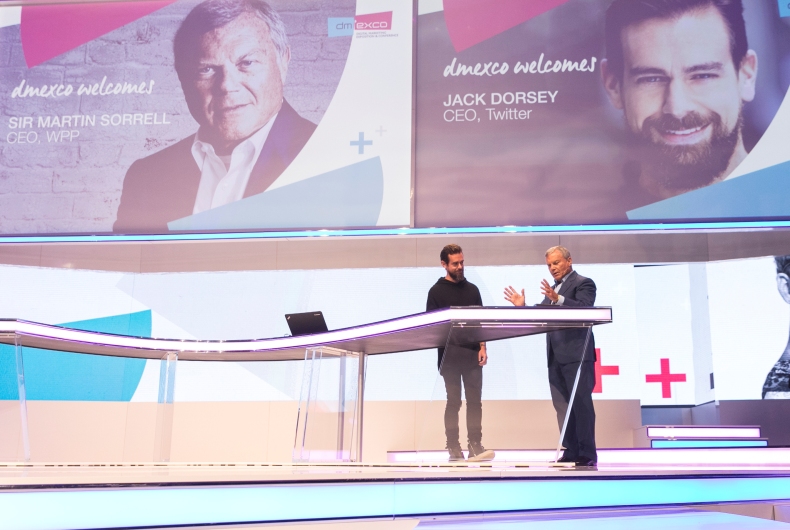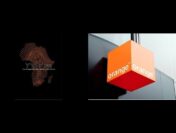 Sir Martin Sorrell does not like a duopoly, at least not when he is on the other side of the table. The CEO of WPP, the largest advertising and marketing services holding company, has been vocal on the need of a third force in the digital marketing industry. On the inaugural day of dmexco 2017 in Cologne, Mr Sorrell did not let go of any chance to grill the CEO and co-founder of Twitter, Jack Dorsey, on the role that Twitter plays for advertisers and the new initiatives the platform is undertaking to stay relevant.
Sir Martin Sorrell does not like a duopoly, at least not when he is on the other side of the table. The CEO of WPP, the largest advertising and marketing services holding company, has been vocal on the need of a third force in the digital marketing industry. On the inaugural day of dmexco 2017 in Cologne, Mr Sorrell did not let go of any chance to grill the CEO and co-founder of Twitter, Jack Dorsey, on the role that Twitter plays for advertisers and the new initiatives the platform is undertaking to stay relevant.
An indicator of where Twitter stands against its competitors such as Facebook and Google can be seen in WPP’s spends on the platforms. From USD 240 million in 2015, WPP had upped its spends in Twitter to USD 300 million but will continue in similar vicinity in 2017. Comparatively it spent USD 5.5 billion on Google and USD 2.2 billion on Facebook in 2016.
According to various industry reports, the latter two account for almost 75 percent of digital advertising spends, hence raising the need for a strong third option.
The Daily Dose
Mr Dorsey did not agree with the WPP Chief when he said Twitter had not managed to achieve the prominence that it had outlined for itself, and that one of the reasons could be that the company was ‘clunky’. “I think everyone is clunky,” Mr Dorsey replied. But his faith in Twitter is reiterated in the fact that it was Twitter that had declined suitors when it was up for a sale a year ago.
“We have achieved a lot, and there is much we have done in the last 11 years that we can be proud of. We may not have always been as focused, streamlined and as simple as we should have been. But we worked on this in the last two years, and we are seeing the results,” Mr Dorsey said.
The last two years were busier than usual for Twitter as it streamlined operations, leading to several high profiled exits, and introduced many new content partnerships and initiatives. The singular objective was to play an active role for people in their daily lives. Unlike its competitors that have by now built large user bases, Twitter has 330 million active users globally – comparatively Facebook has 2 billion users and Instagram has 700 million users each month.
The irrefutable advantage though is that Twitter engages some of the most influential people in the world on its platform.
The Commitment
“Not only some of the most influential but we are also an open platform, what you say on Twitter can be used, and is used on other third party platforms. The conversation on our platform is 24×7 and electric – you will not find it anywhere else,” Mr Dorsey asserted. Twitter’s Live proposition has held it in good stead. By Mr Dorsey’s own admission though, the one area where the product needed to get better was in making it easier for people to find their interests and passion and deliver what matters in that moment.
“Our focus has been to make the platform simpler and better for people. At the same time, we are committed to proving that it works for advertisers and they see the difference it has on return on investment (ROI),” Mr Dorsey said.
Twitter has also been transparent on the actions it has taken towards addressing concerns such as viewability and about why it has built the kind of tech it has or why it measures what it does.
Mr Sorrell has been vocal in the past that social media companies must take responsibility for the fact that they are not just tech companies but also media companies. Mr Dorsey’s response to whether Twitter is a media or a tech company is that it is a newer kind of platform that mixes the traditional definitions of both. “We use tech to amplify and enable people to see and participate in the world. It does not matter whether we are tech or media; what matters is that people use us and we have to focus on the experience,” he said.
Staying True
Perhaps one of the more subtle, but very important, takeaways from the onstage discussion of the two leaders was that Twitter has been true to its beliefs despite the several changes in the United States including the election of Donald Trump as President. Twitter, like many of its peer, has been vocal on the policies it did not agree with and when Mr Sorrell asked if it ever is a reason to worry, Mr Dorsey replied, “It does come to mind and we have, on Twitter, focused also on the ‘why’ apart from just the ‘what’ for a policy but we have to stay true to our own principles.”
On the business side of it, Twitter has also been very focused to stay the course in its Live proposition. Describing it as one of its biggest strengths, Mr Dorsey summed up, “It would be awesome if get the streaming rights to an event like a sporting event but it is not necessary because the conversation around it will still happen on Twitter. It is in our DNA. Our more important role is to show to the whole world what really mattered, highlights if you will, after the event is over.”
For him, the objective five years hence is for Twitter to be platform of choice where people hear of things that matter.




